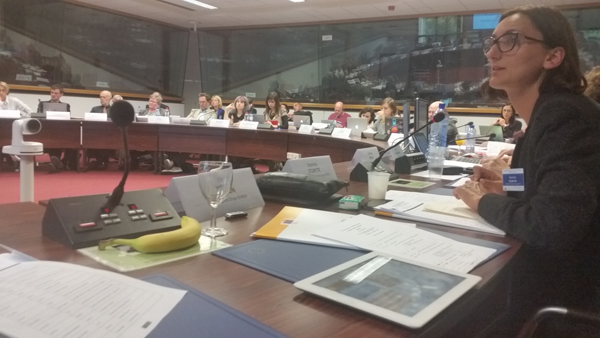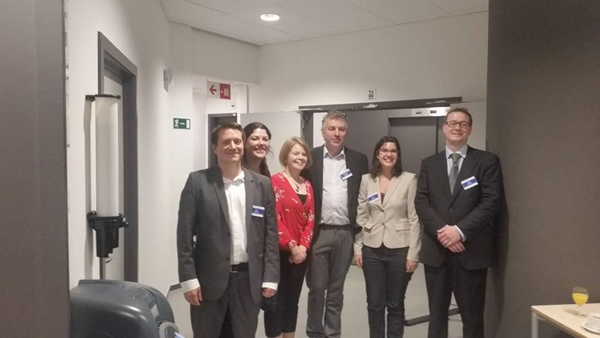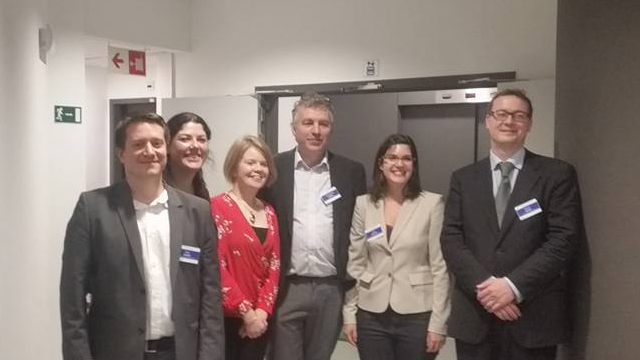45 professionals representing civil society organisations working in the drug field gathered in Brussels to prepare advice for the European Commission and member states.
The Civil Society Forum, an expert group of the European Commission, held its first annual meeting since its re-election this year. The Forum represents a diverse group of NGOs working in various fields, such as prevention, treatment, rehabilitation, harm reduction, and advocacy. Members are selected by the EU Commission based on their expertise and networking ability, and their mandate is for a two-year period. Although members are not paid for their work, and the Commission only provides a limited budget, sufficient to cover just one meeting a year, the Forum has achieved a lot in the past two years. It provided advice for the EU institutions and member states on several drug-policy-related issues, including the impact of the financial crisis on services, new psychoactive substances, quality standards within demand reduction, and preparations for the UN General Assembly Special Session on Drugs, which will be held in New York in April, 2016.

The outgoing chair, Raminta Stuikyte is presenting the report of the previous Core Group
The Forum elected a new chair (Maria Phelan, Harm Reduction International) and vice-chair (Fay Watson, Europe Against Drugs) and a Core Group composed of the leadersn of the five thematic working groups. The first working group, led by David Liddle from the Scottish Drug Forum, will work on minimum quality standards for demand reduction, a topic on which the previous Forum produced a paper with a set of recommendations, which were reflected in the EU Council’s conclusions. The 20 minimum standards were adopted by the EU this year, to help bridge the gap between science and practice, and guide service providers and policy makers alike on how to implement effective interventions. This technical tool provides an opportunity to measure the quality of services and to design new, effective programs. The working group hopes to monitor the practical implementation of these standards in member states.

The newly elected Core Group of the Civil Society Forum on Drugs (from left to right): Marcus Keane, Marie Nougier, Dave Liddel, Fay Watson, Maria Phelan and Peter Sarosi
The second working group, headed by Marcus Keane from the Ana Liffey Drug Project, Ireland, focuses on civil society engagement at the national level – that is, it aims to map existing strategies and mechanisms, in order to meaningfully involve civil society in decision-making in member states. The working group will conduct a survey and produce a paper, with a set of recommendations for best practice.
The third working group, led by the author of this article, is working on civil society input in the mid-term evaluation of the Drug Strategy (2013-2020) and its Action Plan (2013-16), as well as preparation of the new Action Plan on Drugs (2017-2020). The EU Commission is currently undertaking an exercise, with the help of an external evaluator, to assess the existing drug strategy and action plan. This process was outlined in a roadmap published in July, which anticipates a meeting between the external evaluator and the Forum. In 2012, the Forum produced a paper, with recommendations which were partly reflected in the current Action Plan. Learning from that experience, the working group decided to review which recommendations were accepted, and where we needed to do more advocacy. Our new paper will assess trends from the perspectives of service providers, as well as providing examples of best and worst practice on the ground.
The last working group, coordinated by Marie Nougier, International Drug Policy Consortium, is overseeing communication between the Forum and the institutions of the EU and the UN, in order to ensure that civil society voices get heard by decision-makers. This year, the main focus of the group will be on UNGASS, the principal decision-making forum of the United Nations, which aims to discuss drug policies for the first time since 1998 (read our article!). The Forum has already presented its views and recommendations on this subject several times, at the monthly governmental meetings of the Horizontal Working Party on Drugs (HDG). This time, NGOs discussed what recommendations they can propose to the EU, regarding its position paper on UNGASS, to be accepted by the HDG next month. The recommendations followed the five thematic areas of UNGASS: drugs and health, drugs and crime, drugs and human rights & communities, new challenges (new psychoactive substances) and development (problems in producer countries).
The EU Action Plan on Drugs (2013-2016) requires the European Council to organise a timely dialogue between the Forum and HDG. Altough NGOs asked the Council to give them observer status at the meetings, this request was rejected by member states. At least twice a year, the EU presidencies invite the Forum’s representatives to deliver presentations on selected issues. On Tuesday, the EU Commission facilitated a joint meeting between the Forum and the HDG, where the EU presidency (currently Luxembourg), government officials, and civil society representatives could discuss burning issues, under Chatham House rules. At the meeting, the vice-chair of the Forum presented the findings of the Global Civil Society Survey conducted by the Vienna and New York NGO Committees, which was completed by 758 NGOs from all over the world. Representatives of the current and future EU Presidencies outlined their working plan, and discussed how the Forum and its working groups might provide input. Forum members asked the Presidencies to invite them to relevant HDG meetings, and to the conferences of national drug coordinators, to inform them about ongoing processes, and to provide ongoing access to documents.
Peter Sarosi




